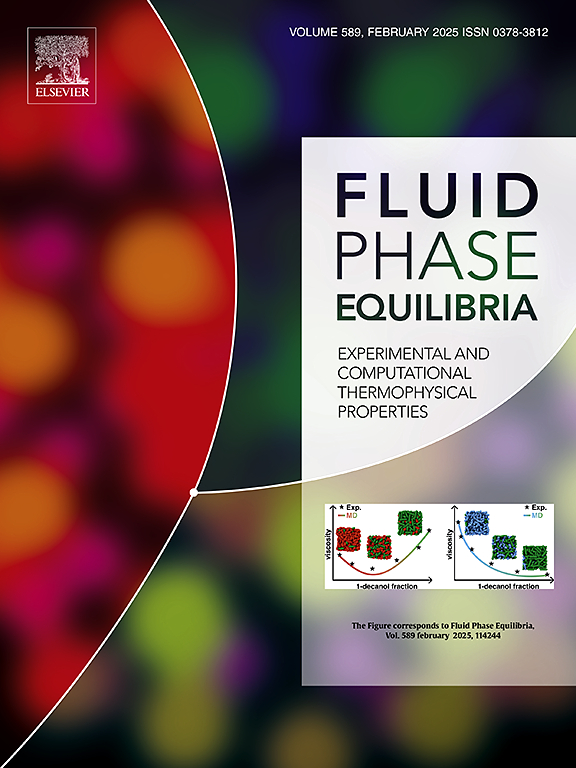Experimental determination and correlation of solubility for R1234ze(E) in POE, PVE, and PAG base oils
IF 2.8
3区 工程技术
Q3 CHEMISTRY, PHYSICAL
引用次数: 0
Abstract
Detailed knowledge about the solubility of refrigerant in oil is essential for the design, operation, and long-term reliability of HVAC and refrigeration systems. Herein, as the leading candidates, the solubilities of R1234ze(E) in polyol ester (POE), polyvinylether (PVE), and polyalkylene glycol (PAG) base oils were investigated using the isochoric saturation method at temperatures from 283 K to 353 K. The viscosity grade of the three base oils is ISO VG 68. Additionally, the Peng-Robinson (PR) + Wilson model was successfully applied to correlate the experimental data. The absolute average relative deviations between the experimental and calculated pressures for R1234ze(E) in POE, PVE, and PAG base oils were 1.56 %, 0.91 %, and 1.46 %, respectively. These results provide valuable physical property data for the selection of suitable oils in vapor compression refrigeration systems.

R1234ze(E)在POE、PVE和PAG基础油中溶解度的实验测定和相关性
详细了解制冷剂在油中的溶解度对于暖通空调和制冷系统的设计、运行和长期可靠性至关重要。本文以R1234ze(E)为主要候选物,在283 ~ 353 K的温度范围内,采用等向饱和方法研究了R1234ze(E)在多元醇酯(POE)、聚乙烯醚(PVE)和聚烷基二醇(PAG)基础油中的溶解度。三种基础油的粘度等级为ISO VG 68。此外,还成功地应用了Peng-Robinson (PR) + Wilson模型来关联实验数据。POE、PVE和PAG基础油中R1234ze(E)的实验压力与计算压力的绝对平均相对偏差分别为1.56%、0.91%和1.46%。这些结果为在蒸汽压缩制冷系统中选择合适的油提供了有价值的物理性质数据。
本文章由计算机程序翻译,如有差异,请以英文原文为准。
求助全文
约1分钟内获得全文
求助全文
来源期刊

Fluid Phase Equilibria
工程技术-工程:化工
CiteScore
5.30
自引率
15.40%
发文量
223
审稿时长
53 days
期刊介绍:
Fluid Phase Equilibria publishes high-quality papers dealing with experimental, theoretical, and applied research related to equilibrium and transport properties of fluids, solids, and interfaces. Subjects of interest include physical/phase and chemical equilibria; equilibrium and nonequilibrium thermophysical properties; fundamental thermodynamic relations; and stability. The systems central to the journal include pure substances and mixtures of organic and inorganic materials, including polymers, biochemicals, and surfactants with sufficient characterization of composition and purity for the results to be reproduced. Alloys are of interest only when thermodynamic studies are included, purely material studies will not be considered. In all cases, authors are expected to provide physical or chemical interpretations of the results.
Experimental research can include measurements under all conditions of temperature, pressure, and composition, including critical and supercritical. Measurements are to be associated with systems and conditions of fundamental or applied interest, and may not be only a collection of routine data, such as physical property or solubility measurements at limited pressures and temperatures close to ambient, or surfactant studies focussed strictly on micellisation or micelle structure. Papers reporting common data must be accompanied by new physical insights and/or contemporary or new theory or techniques.
 求助内容:
求助内容: 应助结果提醒方式:
应助结果提醒方式:


